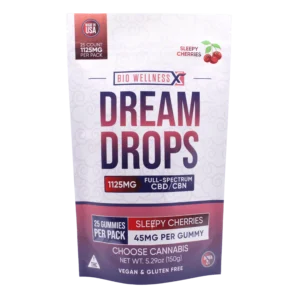key points
CBN may sound like the latest star of the plant cannabis sativa, but the truth is, it’s been around far longer than any other cannabinoid. It’s only recently that the cannabis community started to understand the potential of this hidden Gem.
In this blog, we’ll uncover CBN effects, its benefits, and history to where you can get your hands on some.
What Is CBN?
CBN, short for cannabinol, is one of the hundreds of cannabinoids that come from the cannabis plant. So, how does CBN come about? When you harvest cannabis plants, THC starts to break down when exposed to heat and light, creating CBN. So, THC is almost like a father to CBN. However, unlike THC (the compound that makes you feel high), CBN won’t give you any psychoactive effects.
CBN actually has a long history. Scientists first identified it in the late 1800s, long before they discovered any other cannabinoids. Even though it was found so early, CBN has only recently become popular, especially as a natural sleep aid.
CBN Effects and Benefits
While CBN might not be as well-known as THC or CBD, it’s definitely making waves thanks to its sedative and other beneficial properties. Let’s dig into why both researchers and cannabis fans are raving about cannabinol (CBN).
Sleep
If you’re having trouble falling asleep, CBN might be just what you need. Many people say it helps them catch those much-needed Z’s. According to recent human studies, taking CBN oil can help users get a good night’s rest without the side effects that come with other popular sleep aids.
For instance, a study conducted at Johns Hopkins University found that participants who used a combination of CBN and THC reported improved sleep quality compared to those who took THC alone. These studies showed significant improvements in insomnia symptoms, suggesting that CBN could be beneficial for managing sleep disorders.
Moreover, a recent animal study indicates that CBN increases deep sleep (NREM) and sleep duration in rats. This suggests that CBN might reduce nighttime wakefulness due to its delayed effects, making it easier for people with sleep disorders to stay asleep throughout the night. While more clinical trials are needed, these findings are promising for those seeking natural alternatives to traditional sleep aids.
Physical Relief
When it comes to relief from chronic physical discomfort, CBN shows a lot of promise. In a 2019 study on rats, researchers found that both CBD and CBN could reduce myofascial symptoms. Even better, the combination of CBN and CBD worked more effectively than either one alone. This is great news for people dealing with conditions like temporomandibular disorders and fibromyalgia, as it suggests CBN could be a helpful part of managing aches and pains.
Neuroprotective Effects
CBN might also offer some protection for your brain. A study from 2005 on rats found that CBN could delay the onset of amyotrophic lateral sclerosis (ALS). While these results are exciting, we still need more research to see if the same effects apply to humans.
Anti-inflammatory Effects
Another benefit of CBN is its potential to reduce inflammation. Some studies on rats indicate that CBN can decrease inflammation caused by arthritis.
While CBN is an exciting compound with potential benefits for sleep, physical relief, neuroprotection, and reducing inflammation, it’s important to remember that these study findings are yet to be FDA-approved.
How Does CBN Work?
To understand how CBN works, we first need to explore a fascinating part of our body known as the endocannabinoid system (ECS). The ECS is like a complex communication network that helps regulate many of our body’s functions. Think of it as a traffic control system ensuring everything runs smoothly, from our mood and sleep to our immune response and pain levels.
The ECS consists of three main components: endocannabinoids, receptors, and enzymes. Endocannabinoids are naturally occurring compounds in our bodies, similar to cannabinoids found in plants like cannabis. These endocannabinoids bind to receptors, which are scattered throughout the body, to send signals that help maintain balance and overall well-being. Once their job is done, enzymes come into play to break them down, ensuring the system works efficiently without overdoing anything.
Now cannabinoids from our beloved green plant enter the chat. Cannabinoids act like our own endocannabinoids and send the signals instead.
When CBN enters the body, it primarily binds and activates the CB1 and CB2 receptors. The CB1 receptors are mostly found in the brain and central nervous system, and the CB2 receptors are located in the immune system and other peripheral organs. By attaching to these receptors, CBN can influence various bodily functions.
Take its ability to help you relax and fall asleep. This happens because CBN interacts with the CB1 receptors in the brain, the receptors that control stress response and sleep cycles. That’s why many often turn to CBN as a natural sleep aid, especially if they have trouble winding down at night.
Does CBN Get You High?
As a byproduct of THC, CBN does have mild psychoactive effects—about ¼ as strong as THC. This means that while CBN can produce a high, it’s much milder than what you’d experience with THC. Think of it as a gentler, more subdued version of the THC high.
Anecdotal evidence suggests that the effects of CBN are indeed noticeable, but they lean more towards a calming and body-centric high. Many people describe the CBN high as drowsier and more relaxing, which can be great if you’re looking to unwind or help with sleep. You won’t get the same intense euphoria or cerebral high that THC can provide, but you might feel a gentle wave of relaxation wash over you.
CBN Side Effects
Where there are highs there are lows. While CBN can offer relaxation and sleep support, there are some side effects that you could encounter.
The Dangers of Low-Quality Products
Quality is king. There are tons of products hitting the market every day. Without third-party lab tests, it’s hard to know what’s really in the product you’re using. This lack of transparency can lead to consuming harsh chemicals, pesticides, or even THC levels that exceed legal limits. These contaminants might not only undermine the effectiveness of CBN but also pose health risks.
Possible Side Effects to Be Aware Of
Using CBN, especially in poorly regulated products, can bring about various side effects. These might include dizziness, nausea, or changes in appetite. Additionally, while CBN is not highly intoxicating, large doses might cause drowsiness or fatigue the next day, impacting your daily routine.
Is CBN Legal?
Back in 2018, the Farm Bill made a big change for hemp and its extracts. It legalized hemp and derivatives, as long as they have less than 0.3% Delta-9 THC.
Because the Farm Bill focuses on Delta-9 THC, that opened the door to others from the THC family. So, as long as CBN products have less than 0.3% Delta-9 THC, they’re good to go federally. However, every state can decide its own rules for hemp and its products. Some are cool with it, others have more rules. That means what’s legal can change depending on where you are.
Where To Buy CBN?
With the rise in CBN’s popularity, many dispensaries and CBD shops carry a range of CBN products. But the true bliss is trusted online retailers, such as BiowellnessX.
With online shopping, you can check other customer reviews, check lab reports, and inspect the ingredients. You can literally chill in your pajamas, coffee in hand, and browse through a treasure trove of CBN products without stepping foot outside. No crowds, no lines…Just you, your screen, and a plethora of choices.
From CBN-infused gummies that taste like a tropical vacation to sleek tinctures that you can blend into your daily routine, there’s something for every preference and lifestyle. Plus, online stores often throw in sweet deals and discounts that physical stores can only dream of.
How Does CBN Compare To Other Cannabinoids?
You may wonder, how does this new cannabinoid on the scene compare to the reigning champions such as CBD and THC?
CBN vs. CBD
CBD (cannabidiol) and CBN (cannabinol) are distinct compounds with unique properties. CBD is famous for its non-psychoactive nature, meaning it won’t get you high. It interacts subtly with cannabinoid receptors in the body, potentially promoting relaxation and wellness without altering your mental state.
On the other hand, CBN is mildly psychoactive. While both CBD and CBN interact with cannabinoid receptors, they do so in different ways. CBD doesn’t bind and activate the cannabinoid receptors like CBN does. CBN’s potential as a sleep aid makes it stand out from CBD, which is prized more for its overall calming effects without sedation.
CBN vs. THC
CBN and THC may share a similar chemical structure but have notably different impacts on the body.
THC is well-known for its psychoactive effects, causing a potent high by binding directly to cannabinoid receptors in the brain. In contrast, CBN is much milder and doesn’t induce the same intense euphoria. Its psychoactive properties are subtle, contributing to a more relaxed state rather than a potent high.
Many use THC for its pain-relieving properties or for recreational purposes, while CBN comes in handy as a relaxant and a sleep aid.
Will CBN Show On A Drug Test?
Standard drug tests are designed to detect THC. CBN, on the other hand, is not typically screened for in these tests. However, since CBN results from the breakdown of THC, some CBN products may contain trace amounts of THC as impurities, but these levels are usually too low to trigger a positive result on a drug test designed to detect THC.
Another thing to note is that when your body metabolizes CBN, it produces metabolites that are somewhat similar to those produced when THC is metabolized. However, the concentrations and specific compounds are different enough that they are not typically targeted by standard drug screenings.
Final Thoughts on The Effects Of CBN
In conclusion, CBN is a minor cannabinoid that develops in cannabis plants when THC breaks down due to light and heat after the harvest. It’s known for its calming effects, making it a popular choice as a sleep remedy.
What’s great about CBN is that it offers relaxation without the strong psychoactive effects of typical THC, which is why it’s getting a lot of attention in the cannabis community as a gentle yet effective sleep aid.
With the federal legalization of hemp, you can find many CBN options to match your needs. But remember to check your local laws and the third-party lab tests.
Happy Hemping.

Legal Disclaimer:
By reading this information presented, you agree to release the author of any liability that comes from using this data. This post contains no legal advice. Claims about cannabinoids have not yet been approved by the FDA. Read the full legal disclaimer here.
Other Articles You Might Be Interested In
- Delta-8 THC for First-time Users
- THCp Gummy Review – What to Expect
- Delta-8 THC vs THCp
- What is Delta-8? A Comprehensive Guide
- HHC vs Delta-9: What You Need to Know
- Is HHC Safe: Exploring Potential Risks
References:
- Hemp Production and the 2018 Farm Bill – 07/25/2019 | FDA
- The Controlled Substances Act (dea.gov)
- Abstract Study: Cannabinol Delays Symptom Onset in SOD1
- CBD vs. CBN: What’s the Difference
- Cannabinol inhibits oxytosis/ferroptosis by directly targeting mitochondria
- CBN Explained: How this Cannabinoid Can Lead to Better Sleep
- Cannabinoid and Endocannabinoid Modulation of Immune Function
FAQs on CBN effects
CBN derived from hemp, containing less than 0.3% Delta-9 THC is federally legal. However, its legality varies by state. Always check your local laws on CBN, especially if your state doesn’t permit recreational cannabis.
CBN has gained recognition as a sleep remedy for its soothing and calming effects, especially beneficial for those struggling with a sleep disorder. Moreover, recent research highlights additional potential benefits such as antibacterial properties and potential relief from discomfort.
Research indicates that CBN could aid sleep thanks to its sedative properties and potential influence on the body’s sleep-wake cycle regulation system.
CBN is almost non-psychoactive, it contains little traces of THC, which is enough to make you relax, but not enough to get you high.










